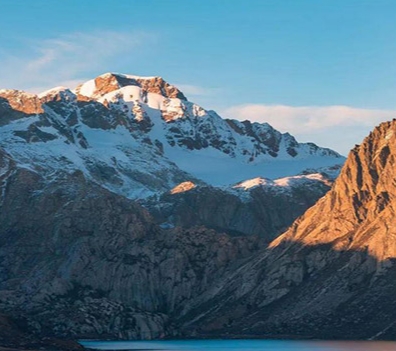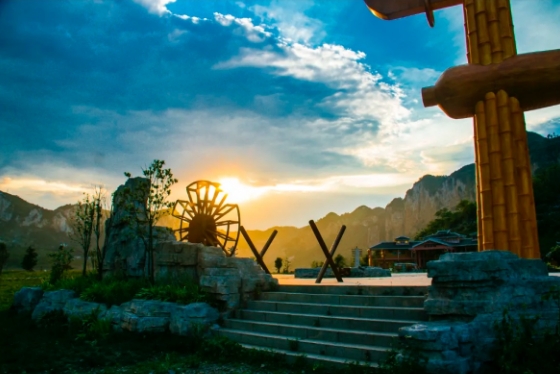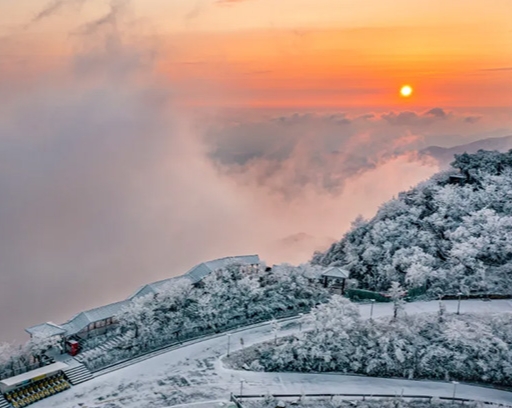Sustainable Development of Mountain Tourism in Asia Promotes Exchange of Civilizations
On 18 August, the 2022 Asian Mountain Tourism Promotion Conference on Amity, Sincerity, Mutual Benefit, Inclusiveness, Cooperation, and Sharing —— Jointly Building a New Future for Asian Mountain Tourism was officially launched in Guiyang, Guizhou province. During the opening ceremony, He Yafei, Secretary General of IMTA, accepted an exclusive interview.

Here is the full speech:
In the current situation of the deep development of the unprecedented changes of the century, the epidemic continues to wreak havoc, geopolitical tensions continue to rise, the global economy is in recession, the international community is facing unprecedented challenges of many crises, and the world order and global governance system are in a transitional period of breaking down the old and establishing the new, uncertainty and turbulence have become the "norm".
In this new historical period of complexity and change, it is our primary goal for this conference to promote tourism in Asia, especially mountain tourism, which has been hit hard by the epidemic, and to make an important contribution to economic recovery, job stability and poverty reduction in Asia and globally, while striving to promote the exchange and integration of civilizations and cultures among countries.
Tourism is a component and bearer of civilization and culture, providing an irreplaceable platform and channel for people to have the hope of a better life, to explore other cultures and to integrate into the natural ecology. Mountain tourism, with its unique ecological environment and geographical and cultural advantages, shows the rich connotation of harmonious coexistence and beauty between man and nature and man and man.
Mountain tourism is an important pillar of the tourism industry. According to the United Nations World Tourism Organization, mountain tourism accounts for about 20% of the global tourism market, with an annual output value of 100 to 140 billion U.S. dollars, and shows a year-on-year growth trend. Mountain tourism has huge potential.
As one of the earliest human settlements, Asia is an important birthplace of human civilization. Asia is a vast and beautiful region with two-thirds of the world's population, 47 countries and more than 1,000 ethnic groups. Asia has extremely rich mountain tourism resources and many unique and mature tourism products, with unlimited development prospects.
Taking into account the new political and economic changes in Asia and the goal of sustainable development of mountain tourism, I would like to discuss some ideas and suggestions for promoting the development of mountain tourism in Asia and promoting the exchange of civilizations and cultures among Asian countries:
1. Reduce and eliminate geopolitical tensions, abandon the "cold war mentality", aim to build a community of human destiny, unite and help each other, be open and inclusive, and actively promote the stable and in-depth development of mountain tourism in Asia.
The sustainable development of tourism in Asia cannot be achieved without the free flow of people, capital, resources, and information under the scenario of globalization, which means that a relatively liberal political and economic environment is needed, and this is what is meant by the so-called "tourism without borders". Geopolitical tensions and even conflicts are "poison" for the development of tourism in Asia, so countries should be guided by common human values and break down various artificial geopolitical and economic barriers to provide the necessary conditions for the comprehensive revitalization and development of tourism.
2. " Seek development together, and start a new voyage with a thousand sails". Asia is rich in mountain tourism resources, so both domestic and outbound tourism will see a strong rebound from the demand side as the victory over COVID-19 pandemic is imminent. People have high expectations for mountain tourism, hoping that the mountain tourism industry can provide healthy and safe "tourism + culture", "tourism + health and wellness", "tourism + sports" and other novel tourism experience, which puts forward high requirements for the supply side of mountain tourism.
Currently, under the double impact of the epidemic and geopolitics, supply chain crisis, talent chain crisis and industry chain crisis have surfaced, forming a serious challenge to the tourism industry.
While challenging the tough situation, the opportunities are also unprecedented. The sustainable development of mountain tourism cannot be just a simple repetition of the past forms of tourism, but needs to increase the efforts of tourism supply-side reform, and innovate ideas and practices to adapt to the new requirements of people for mountain tourism.
All links of the tourism industry chain, including government departments, tourism enterprises, tourism associations and research institutes, should play a role in maintaining and improving the restoration and renewal of the supply chain, reducing brain drain, improving standard setting and studying the direction of industry trends, so as to jointly create a new pattern, a new environment and a new atmosphere for mountain tourism in Asia.
3. Use tourism as a vehicle to strengthen people-to-people contacts, strive to boost exchanges and cooperation among civilizations and cultures, create conditions, build a platform and optimize the environment for enhancing mutual understanding and eliminating geopolitical suspicions and even hostility.
We need to break regional and country-specific restrictions, promote the real implementation of the concept of "tourism without borders", and accelerate the recovery of tourism, especially mountain tourism in Asia. We can try to drive civil diplomacy and public diplomacy with tourism, push for mutual cultural appreciation and civilizational exchange with tourism, enhance friendship among Asian peoples, and promote a sense of security and trust, thus playing the role of a lubricant for reducing geopolitical prejudices, eliminating doubts, and preventing conflicts.
4. Make full use of the powerful impetus of the technological revolution to integrate and embed the new technologies, inventions, and models of the comprehensive upgrading of networks in the information age and digital economy into the development of mountain tourism in Asian countries, empowering technology to provide tourists with new experiences of mountain tourism that are up-to-date, physically, and mentally healthy, and powerfully attractive.
Adapt to the general trend of world economic development, use technology empowerment, cultural empowerment, and green empowerment, innovate the supply chain, industry chain, data chain and talent chain of regional mountain tourism from an Asian perspective, create a balanced and inclusive mountain tourism development model, and build a new pattern of sustainable mountain tourism development.
5. Promoting the new development of mountain tourism in Asia cannot remain only in words and rhetoric, but requires governments and mountain tourism practitioners to put their feet on the ground, one step at a time, starting from me, from now on, to turn new concepts, ideas, and programs of mountain tourism into reality and products. Here are some suggestions as follows:
First, to build a neutral, inclusive, and professional industry standard for mountain tourism, and to call on countries to support the introduction of relevant supporting policies;
Mountain tourism has unique ecological and environmental resources and diverse regional cultural characteristics, requiring a standard system in line with the characteristics of mountain tourism, including service standard system, safety standard system, environmental standard system, civilization protection standard system, etc., to ensure the sustainable and healthy development of mountain tourism.
The development of Asian mountain tourism standards should take into account the common problems and long-term development faced by Asian countries and regions. For example, mountain tourism destinations are generally rich in negative oxygen ions and excellent ecological environment, which are suitable for living in a retirement and health preservation. As the problem of aging is increasingly plaguing Asian countries, it is important to consider the integration of medical, insurance, and health industry resources in the development of relevant standards.
Second, mountain tourism should cooperate with the national development strategies of each country, to contribute to the economic development, poverty reduction and rural revitalization of each country. For example, China has done a relatively good job of integrating mountain tourism and rural revitalization, and has some successful experiences to learn from.
Third, talent is the cornerstone of tourism development. Mountain tourism, because of its rich cultural connotation, requires a variety of professional talents who master new knowledge and skills. Combined with higher education and vocational education, the government and tourism enterprises should coordinate and link up to cultivate more mountain tourism talents and set up a mechanism for talent selection, cultivating and training. It is urgent to encourage the development of professional research institutions.
It is equally important to accelerate research on the sustainable development of mountain tourism. "Tourism +" is the new concept of sustainable development of mountain tourism proposed by the International Mountain Tourism Alliance at its inception. There is a need to develop mountain tourism and other sectors in synergy, to develop together, to cultivate twin ideas of economic and cultural development, and to create more new experiences in mountain tourism that people will enjoy and be attracted to.
Fourth, to ensure the coordination and mutual promotion of mountain tourism development and environmental protection, seeking the development of mountain tourism in the protection of mountain resources. The relationship between conservation and development is symbiotic and shared, not mutually exclusive. On the issue of conservation and development, the government should give policy support to help the tourism industry transform, while the tourism industry should use the "tourism +" concept to integrate the common development of a variety of industries, to make a larger, new industrial cake, and expand the transformation space.
We will usher in an ever-changing and brand new world, and Asia will naturally be no exception. As the world landscape is changing, the international order is changing, and the global governance system is changing, so the environment, philosophy, and programs of mountain tourism should also present corresponding changes.
The International Mountain Tourism Alliance calls on Asian countries and all parties involved in the mountain tourism industry, standing at a new historical starting point, to work together and actively explore to contribute to the building of a community of shared future for mankind.







